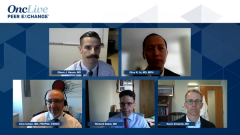
Immunotherapy in Basal Cell Carcinoma
Two experts provide their thoughts on phase 2 data concerning the use of cemiplimab for treating locally advanced basal cell carcinoma.
Episodes in this series

Glenn J. Hanna, MD: Speaking of which hedgehog inhibitors, toxicity, and limited responses, we have FDA approval for immunotherapy in basal cell carcinoma [BCC]. I’ll leave a slide up based on the phase 2 data for cemiplimab in the locally advanced basal cell carcinoma state after exposure to a hedgehog inhibitor therapy. That was recently published in Lancet Oncology. Let’s start with Dr Cohen. Can you discuss the rationale of this trial, the approval, and your thoughts on the use of these agents.
Ezra Cohen, MD, FRCPSC, FASCO: Yes, thanks again. As you as you mentioned, this was a trial in patients with locally advanced basal cell carcinoma who had been exposed to a hedgehog inhibitor and had progressed. We do know that basal cell carcinomas typically have a quite a high tumor mutational burden. In fact, it’s among the highest of any known malignancy. That formed the rationale to try an anti–PD-1 antibody in these patients. In addition, there had been case reports or even case series of patients with basal cell carcinoma who responded to anti–PD-1 antibodies, and there was at least the impetus that supported the hypothesis that these agents would be active. That’s exactly what we saw with this trial. This was a single-agent study of cemiplimab given at the typical dose every 3 weeks, and the primary end point was objective response rate.
Let’s step back for a minute and recall that we wouldn’t expect to have an appreciable or even a modest response rate in patients with basal cell carcinoma with cytotoxic chemotherapy. There are no alternatives for patients once hedgehog inhibitors stop yielding efficacy. Here you see the objective response rate was 31%, the median time to response was 4 months, but the median progression-free survival was 19 months. The median duration of response had not been reached at data cutoff. In a group of patients who have an unmet need, there are no other reasonable options. I don’t think any other mechanism is able to deliver this type of efficacy. Those are certainly encouraging data for cemiplimab in this setting.
Glenn J. Hanna, MD: Dr In, anything you would add? Would you consider in any context that the signal is regardless of agents? There are other drugs like pembrolizumab and nivolumab that have been explored in this and in cutaneous squamous cell. Would you feel comfortable using some of those agents if data were to emerge in this setting? Also, what’s your practical experience using immunotherapy in BCC?
Gino K. In, MD, MPH: I would largely echo Dr Cohen’s comments. This is a major step and major progress for patients with this disease, especially in the hedgehog [inhibitor]–failed setting. Some of these outcomes are fairly consistent with what we’ve seen using checkpoint inhibitors in other cutaneous malignancies, as well as other solid tumors as well. Some of the patients are sensitive, and some of these responses are durable, with good quality of life. Some patients are even achieving a complete response. This is very promising for these patients. This is consistent with what I’ve seen in our practice. Looking back at some of the initial case reports that Dr Cohen had mentioned, other patients in this situation had also been treated with other PD-1 inhibitors. I don’t expect that there would be a significant difference with 1 vs the other. All those certain trials to demonstrate that would be needed to know for sure.
Glenn J. Hanna, MD: It certainly seems that way based on the cutaneous squamous cell data, which we’ll get to in a moment. That was a very healthy discussion. This wraps up our focus on basal cells.
This transcript has been edited for clarity.




































